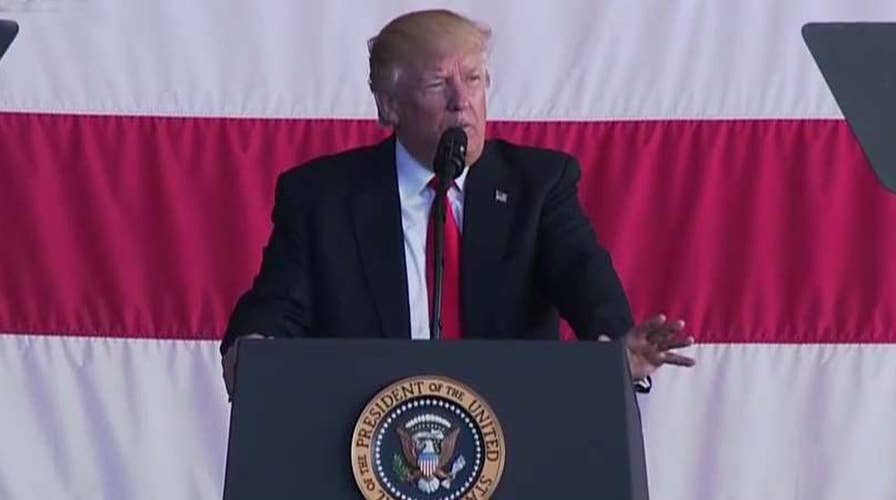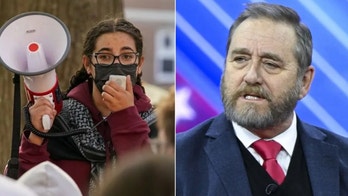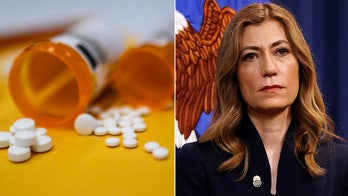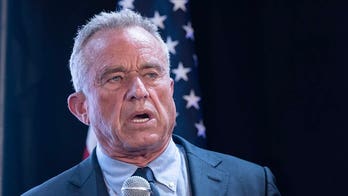Trump shares Memorial Day message, honors fallen hero
President addresses U.S. troops in Sigonella, Italy
President Trump on Saturday in Italy thanked overseas U.S. troops, in concluding his trip through the Middle East and Europe in which NATO, radical Islamic terrorism and climate change emerged as key issues.
“I think we hit a homerun no matter where we are,” Trump said at Naval Air Station Sigonella, in Sicily. “And now we’re getting on that very big plane and heading back to Washington. I can think of no better way to conclude our first foreign trip than to spend time with you. … We will always support you. And we will never, ever forget you.”
Trump also said he leaves amid new hope among nations on “eradicating the terrorism that plagues humanity.”
Earlier in the day, Trump declined to join six other world powers Italy in affirming the 2015 Paris Climate Agreement.
Trump, who during his presidential campaign once called climate change a “hoax,” made the announcement on Twitter ahead of the other nations pledging their commitment to the deal at the G-7 Summit in Taormina, Italy.
The president was under heavy international pressure during the trip to affirm the United States’ commitment under the Paris agreement to reduce the emission of greenhouse gases and other pollutants believed to be warming the earth to harmful levels.
While at the Vatican, Trump received from Pope Francis a copy of his 2015 papal treatise that links fossil fuels to global warming.
And he was pressured about the climate deal after leaving the Vatican, when attending NATO and European Union meetings in Brussels with other world leaders.
Trump began his trip Saturday in Saudi Arabia before going to Israel and three European countries.
He was welcomed at the Saudi airport by King Salman in a royal, red carpet ceremony.
The trip has since gone off without a major misstep, as Trump tries to build and strengthen international alliances to fight radical Islamic terrorism and the threat of Iran and North Korea building a nuclear weapon.
Prior to Trump's arrival, the pope had publically disagreed with some of the president's plans and policies, including ones to build a wall along the entire U.S.-Mexico border and to impose a temporary travel ban on several mostly-Muslim nations.
“I won’t forget what you said,” Trump told the pope at the end of their roughly 30-minute private meeting Wednesday, in the Vatican, in Rome, the second stop of the presidential trip.
Trump’s speech Sunday in Saudi Arabia came one day before a bomb outside an Ariana Grande concert in Manchester, England, killed 22 people. The Islamic State terror group has claimed responsibility for the deadly attack that also injured dozens of others.
“This is a battle between barbaric criminals who seek to obliterate human life, and decent people of all religions who seek to protect it. This is a battle between good and evil,” Trump said in the speech to leaders of Arab nations, the cradle of the Muslim religion.
Trump returns to the White House under continuing investigations into whether his inner circle colluded with Russia to influence his winning 2016 presidential campaign or before he took office in January.
Backing out of the climate accord had been a central plank of Trump's campaign, and aides have been exploring whether they can adjust the framework of the deal even if they don't opt out entirely.
Among the G-7 leaders who leaned heavily on Trump to stay in the climate deal was German Chancellor Angela Merkel, who said: "We put forward very many arguments."
During his trip, Trump also touted a renewed commitment by NATO's member to spend more on defense.
"Many NATO countries have agreed to step up payments considerably, as they should. Money is beginning to pour in- NATO will be much stronger," he said.
Trump was referring to a vow by NATO countries to move toward spending 2 percent of their gross domestic product on defense by 2024. Only five of NATO's 28 members meet the target: Britain, Estonia, debt-laden Greece, Poland and the United States, which spends more on defense than all the other allies combined.
There is no evidence that money has begun to "pour in" -- and countries do not pay the U.S. or NATO directly. But Germany, for instance, has been increasing its defense spending with the goal of reaching the 2 percent target by 2024.
The Associated Press contributed to this report.





